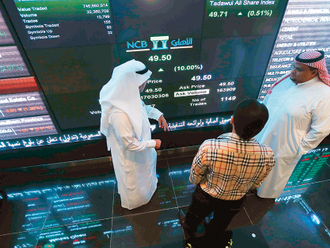Mutual-fund fees are declining as the stock market rises and investors become savvier about expenses, according to a new study.
The sharp rise in share prices last year triggered discounts in which fees in many funds dropped as the assets in those portfolios rose, according to the analysis by fund tracker Morningstar Inc.
The price reductions, known as breakpoints, automatically kick in based on asset size. The savings were most pronounced in stock funds.
The average fund investor paid 0.71 per cent in expenses last year, or 71 cents for each $100 (Dh367) invested.
That’s down slightly from 0.72 per cent in 2012. The figure has slowly fallen from 0.95 per cent in 2000.
Based on the funds themselves — as opposed to what investors actually pay — the average cost is higher at 1.25 per cent, according to Morningstar. That’s down from 1.28 per cent in 2012 and 1.47 per cent in 2003.
The data show that individual investors, including those in 401(k) retirement accounts, are becoming much smarter about expenses.
Shift in mentality
During the dot-com boom in the late 1990s, investors shrugged off concerns about high fees. Paying expenses that sometimes approached 2 per cent didn’t seem like much when the stock market was soaring.
That mentality has steadily shifted in the wake of two bear markets that decimated many 401(k) accounts.
Last year, 95 per cent of net inflows went into funds in the cheapest 20 per cent of their investment categories. In the two years before that, the inflow number actually topped 100 per cent as money rushed out of more expensive funds.
In the 1990s, by contrast, only 56 per cent of net inflows went to the least expensive funds.








